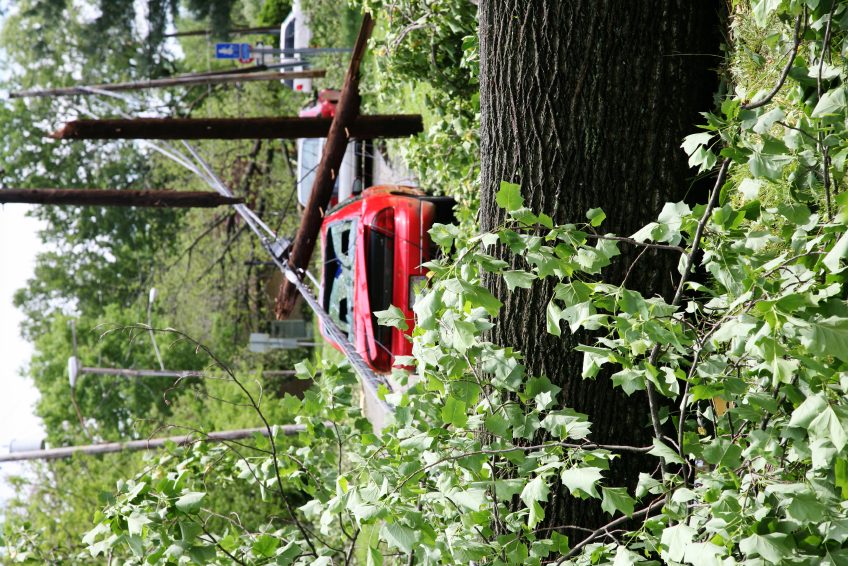Last Updated October 26, 2022.
No matter how much organization and preparation you do, the fact is that with weather, you can expect the unexpected. And that includes sometimes having to pay for unexpected supplies, repairs, and other expenses. Remember, Omni Financial is here for you if you need funds to help prepare for severe weather or repair storm damage to your home or car. Whether you apply for a loan online, over the phone, or at one of our branch locations, the process is easy and fast.
While it is impossible to control the weather, you can control what you do to prepare yourself for such events. It is important to take steps to protect yourself, your family, and your home. If you are in an area with a severe weather warning, here are some things you should do well-before the storm hits:
- Survey the outside of your home. Put any bicycles, lawn furniture, sports equipment, flower pots, outside décor, trash cans, etc. in a garage or shed. Items like these can turn into flying weapons if the wind picks them up. Anything that is unable to be brought to an inside location should be tied down securely.
- Fill your car’s gas tank. During Hurricane Sandy in 2012 there was a huge gas shortage as many gas stations and key gas pipelines lost electricity, some refineries were out of commission, and delivery trucks could not deliver gas due to closed roads. Be prepared by making sure your gas tank is filled before the storm hits. In winter, a full tank of gas is also important for protecting the fuel line in your car from freezing.
- Close windows, doors, blinds, shades, and hurricane shutters. If you do not have hurricane shutters, plywood should be used to close and board up your windows and doors.
- Clean the gutters. Make sure your gutters are free of leaves and other debris. Gutters need to be as clear as possible so that heavy rain or melting snow will be able to drain properly. Water that is unable to drain through the gutters will go over your gutters and can drain along the wall and possibly into your home.
- Charge your phone. In severe weather, your cell phone will be extremely important for reaching family members, emergency services, and insurance companies, and keeping up with weather updates and emergency alerts. Fully charge any phones, tablets, or other mobile devices before the storm. Also, charge any extra older working phones you may have around the house. While a storm might knock out cell phone service, it is still essential to be prepared.
- Move valuables to safe areas. Computers, televisions, electronic equipment, and small appliances should be moved to the upper floors of your home, in case there is flooding on the lower levels. To protect them further, wrap the items in plastic, sheets, or blankets. Move them to the center of the room, away from windows.
- Stock up on a 3-7 day supply of food and water. Keep a supply of non-perishable food on hand. Peanut butter, canned soups, vegetables and meats (don’t forget the manual can opener!), crackers, nuts, and granola bars are some good choices. If you are living with babies, seniors, or people with medical conditions, make sure you consider their special dietary requirements. As for water, estimate that you will need one gallon of water per day, per person.
- Prepare for your pets – During extreme weather, bring all your pets inside. Have a 3-7 day supply of pet food plus carriers, leashes, veterinarian records, feeding dishes, litter boxes, litter, blankets, pet photos, and any other items you might need. Make sure your pets wear collars and tags with your contact info and information about any special medical needs. Before the storm, arrange a safe place to leave your pets (like a relative’s home, boarding kennel, vet’s office, or local animal shelter) in case you need to evacuate the area. Never leave your pets behind.
- Put together an emergency supply kit – Some emergency supply kit essentials include prescription medication, flashlights, batteries, a radio, candles and a lighter, baby wipes, a whistle, duct tape, Swiss Army knife, blankets, copies of ID and insurance information, personal care products, phone chargers, and extra cash. In the event of a blizzard or ice storm, you’ll also want to have sand, rock salt or non-clumping kitty litter to spread on slippery steps and walkways.
- Make a plan – Everyone in the family should have a written list of emergency contacts including the phone numbers of family members, fire, police, ambulance, etc. These should also be posted by the home phones and saved in cell phones. Verify that everyone knows who to call in case of an emergency and what to do if you should get separated. In addition, plan what you will do in the case of an evacuation. Will you be able to stay with family or friends, or will you need to go to a hotel or an emergency shelter? Let your out-of-town family members or friends know your evacuation plans.
For more information about preparing for severe weather, visit the American Red Cross, the Centers for Disease Control and Prevention, or USA.gov.
No matter how much organization and preparation you do, the fact is that with weather, you can expect the unexpected. And that includes sometimes having to pay for unexpected supplies, repairs, and other expenses. Remember, Omni Financial is here for you if you need funds to help prepare for severe weather or repair storm damage to your home or car. Whether you apply for a loan online, over the phone, or at one of our branch locations, the process is easy and fast.
The information provided in this blog post is for informational purposes only.

Friendship Rewards Program
Refer a friend and get a $25 Omni Gift Card



